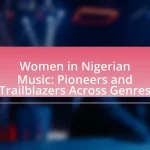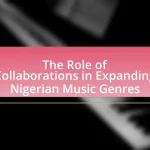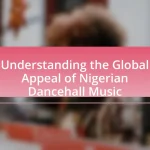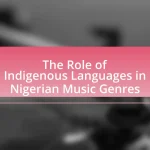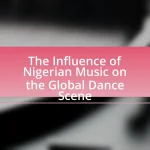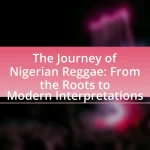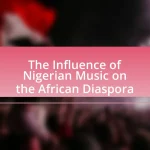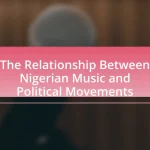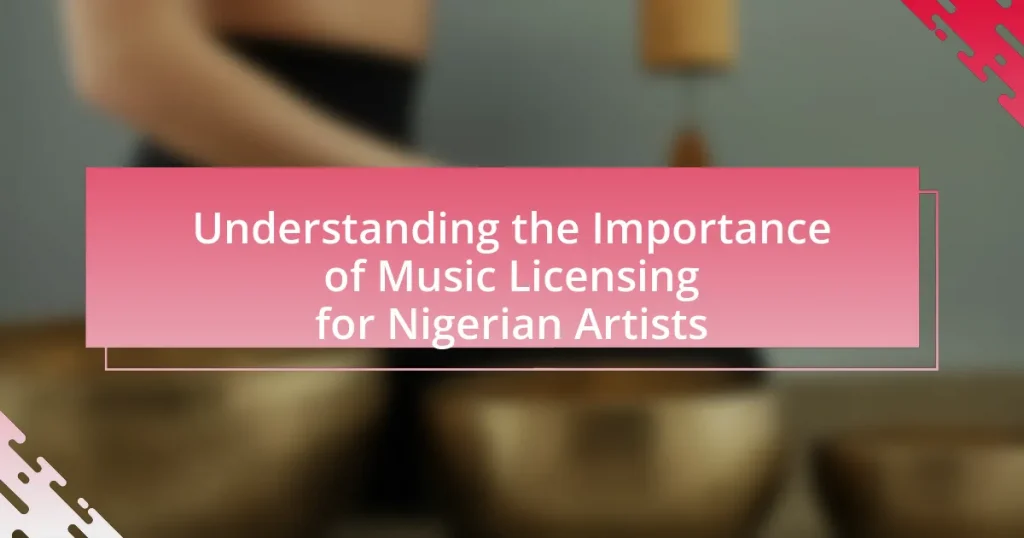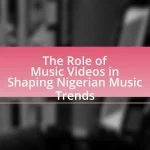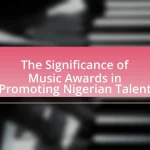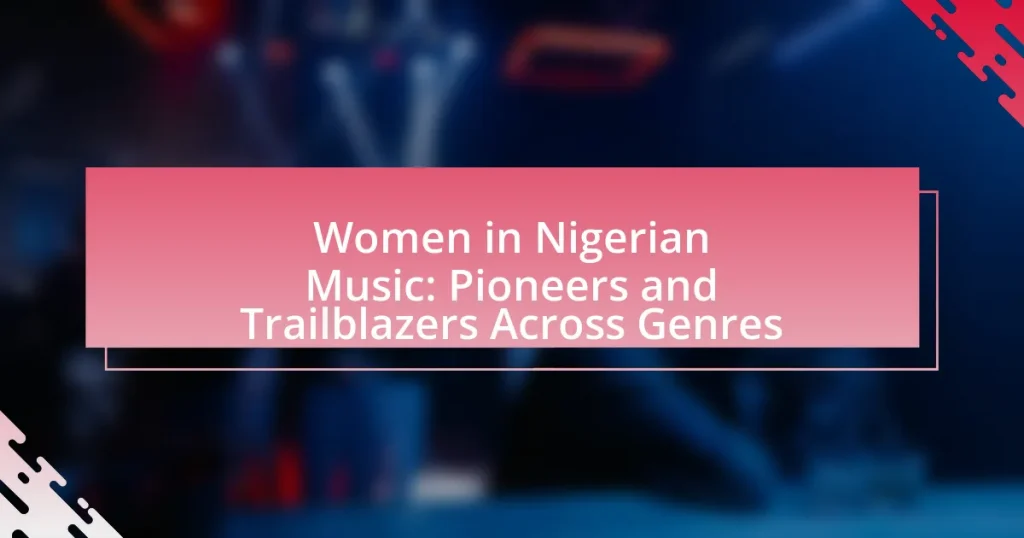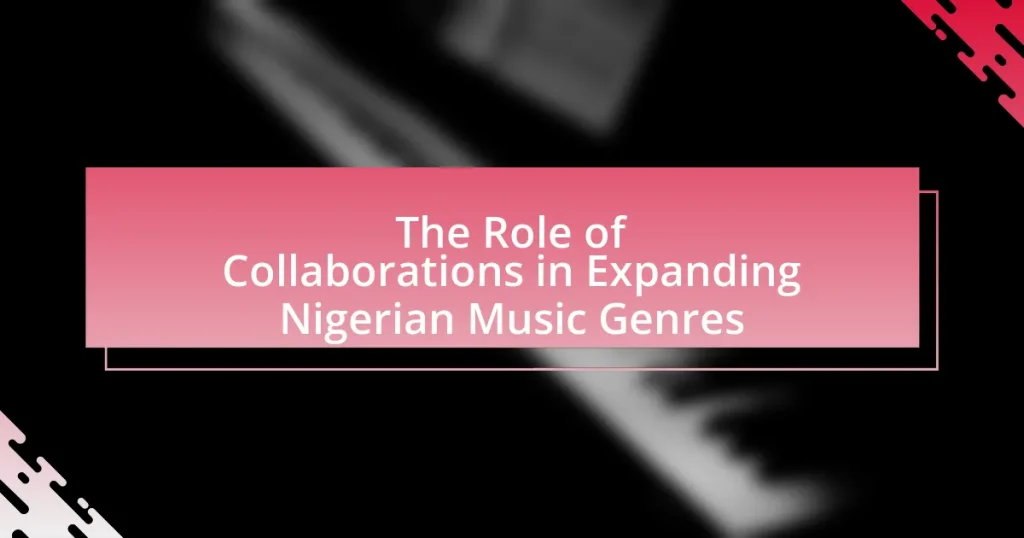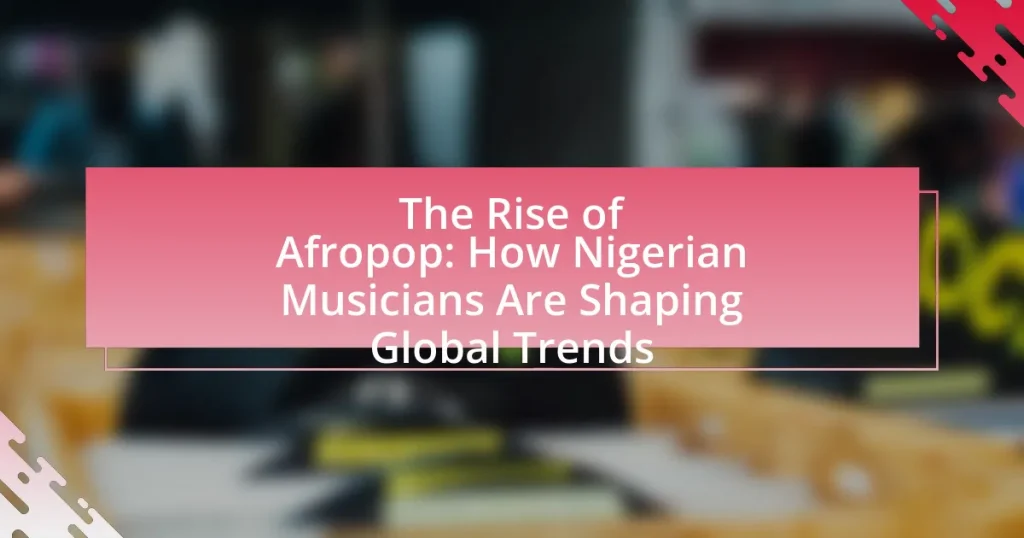Music licensing is a critical legal framework that grants Nigerian artists the permission to use their music in various formats, ensuring they receive royalties and protecting their intellectual property rights. The article outlines the importance of music licensing for artists in Nigeria, detailing how it works, the types of licenses available, and the legal influences shaping the licensing landscape. It also addresses the challenges artists face, such as piracy and lack of awareness, while emphasizing the financial benefits of proper licensing practices. Additionally, the article highlights the role of organizations in supporting artists and provides resources for navigating the complexities of music licensing effectively.
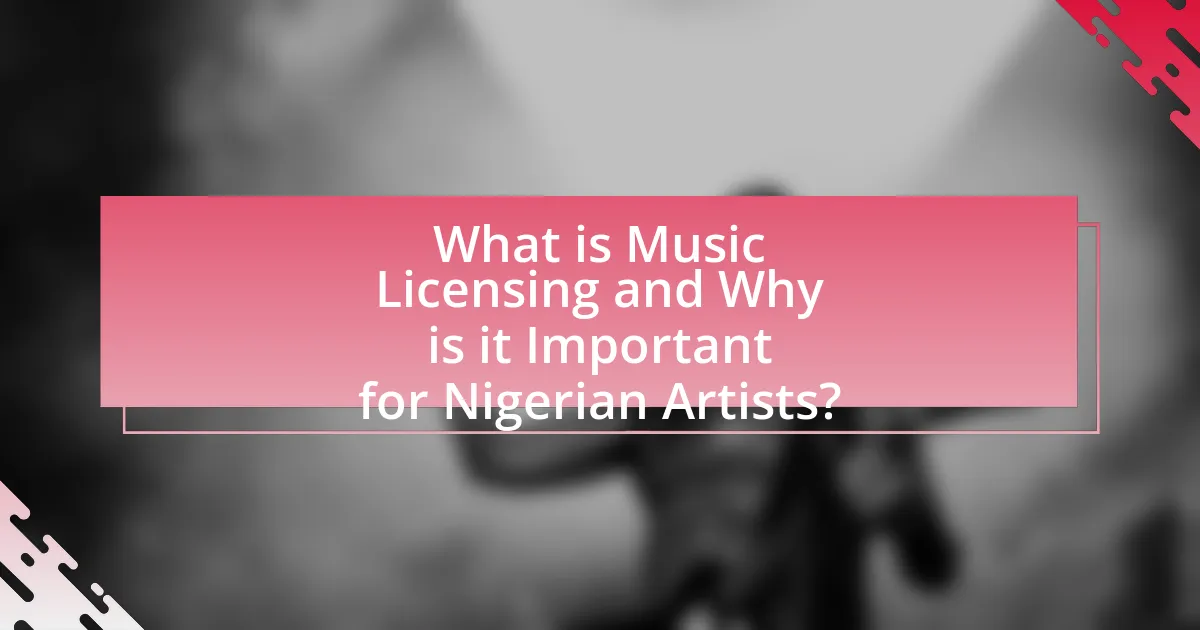
What is Music Licensing and Why is it Important for Nigerian Artists?
Music licensing is the legal permission granted to use music in various forms, such as recordings, performances, or broadcasts. For Nigerian artists, music licensing is crucial as it ensures they receive royalties for their work, protecting their intellectual property rights. According to the Nigerian Copyright Commission, proper licensing allows artists to monetize their music, thereby fostering a sustainable career in the competitive music industry. Additionally, licensing helps in preventing unauthorized use of their music, which can lead to financial losses and diminished reputation.
How does music licensing work in Nigeria?
Music licensing in Nigeria involves the legal permission required for the use of music in various formats, ensuring that artists receive compensation for their work. In Nigeria, the process typically includes registering with a collective management organization, such as the Copyright Society of Nigeria (COSON), which manages the rights of music creators. These organizations collect royalties on behalf of artists when their music is played on radio, television, or in public venues. The Nigerian Copyright Act of 1970 provides the legal framework for music licensing, protecting the rights of creators and ensuring they are paid for the use of their intellectual property.
What are the key components of music licensing?
The key components of music licensing include copyright ownership, types of licenses, and the terms of use. Copyright ownership establishes who holds the rights to the music, which is crucial for determining how the music can be used. Types of licenses, such as mechanical licenses, synchronization licenses, and performance licenses, dictate the specific permissions granted for various uses of the music. The terms of use outline the duration, territory, and any restrictions associated with the license, ensuring that all parties understand their rights and obligations. These components are essential for protecting the interests of artists and ensuring legal compliance in the music industry.
How do Nigerian laws influence music licensing?
Nigerian laws significantly influence music licensing by establishing the legal framework that governs copyright protection and the rights of artists. The Copyright Act of 1970, along with subsequent amendments, provides the basis for protecting musical works, ensuring that creators receive royalties for their use. This legal structure mandates that music licensing agreements must adhere to specific regulations, such as the requirement for written contracts and the registration of works with the Nigerian Copyright Commission. Additionally, the enforcement of these laws helps to combat piracy, thereby safeguarding the financial interests of artists and promoting a fair music industry.
What types of music licenses are available to Nigerian artists?
Nigerian artists can access several types of music licenses, including mechanical licenses, synchronization licenses, performance licenses, and master use licenses. Mechanical licenses allow artists to reproduce their music on physical formats or digital platforms, while synchronization licenses permit the use of music in audiovisual works, such as films and commercials. Performance licenses are necessary for public performances of music, ensuring that artists receive royalties, and master use licenses grant permission to use a specific recording of a song. These licenses are crucial for protecting the rights of artists and ensuring they receive compensation for their work.
What is a mechanical license and how does it apply?
A mechanical license is a legal authorization that allows a party to reproduce and distribute a copyrighted musical composition in a physical format, such as CDs or digital downloads. This type of license is essential for artists and record labels when they want to cover or sample existing songs, ensuring that the original songwriters receive royalties for their work. In the context of Nigerian artists, obtaining a mechanical license is crucial for compliance with copyright laws, enabling them to legally distribute their music while respecting the rights of the original creators.
What is a synchronization license and when is it needed?
A synchronization license is a legal agreement that allows the use of a piece of music in conjunction with visual media, such as films, television shows, or advertisements. This type of license is needed whenever a creator intends to pair music with visual content, ensuring that the rights of the music’s copyright holder are respected and compensated. For instance, if a Nigerian artist’s song is to be featured in a movie, obtaining a synchronization license is essential to avoid copyright infringement and to legally use the music in that context.
Why should Nigerian artists prioritize music licensing?
Nigerian artists should prioritize music licensing to protect their intellectual property and ensure they receive fair compensation for their work. By securing licenses, artists can legally distribute their music, preventing unauthorized use and potential copyright infringement. According to the Nigerian Copyright Commission, music licensing helps artists earn revenue through royalties, which can significantly contribute to their income. Furthermore, licensed music can be used in various media, enhancing exposure and opportunities for collaboration, thereby fostering growth in the competitive music industry.
How does music licensing protect artists’ rights?
Music licensing protects artists’ rights by legally granting them control over the use of their music, ensuring they receive compensation for its use. This legal framework allows artists to license their work for various purposes, such as broadcasting, streaming, and public performances, thereby safeguarding their intellectual property. For instance, organizations like the Performing Rights Society (PRS) in the UK and the American Society of Composers, Authors, and Publishers (ASCAP) collect royalties on behalf of artists, ensuring they are paid when their music is played publicly. This system not only incentivizes creativity but also helps prevent unauthorized use of their work, reinforcing the financial and legal rights of artists in the music industry.
What financial benefits can arise from proper licensing?
Proper licensing can lead to significant financial benefits for Nigerian artists, including increased revenue from royalties and enhanced marketability. When artists secure the appropriate licenses for their music, they can earn royalties from various platforms such as streaming services, radio play, and public performances. According to the Nigerian Copyright Commission, artists can receive up to 50% of the revenue generated from their licensed works, which can substantially boost their income. Additionally, proper licensing can attract more lucrative opportunities, such as endorsements and collaborations, as it establishes the artist’s professionalism and legal standing in the industry.
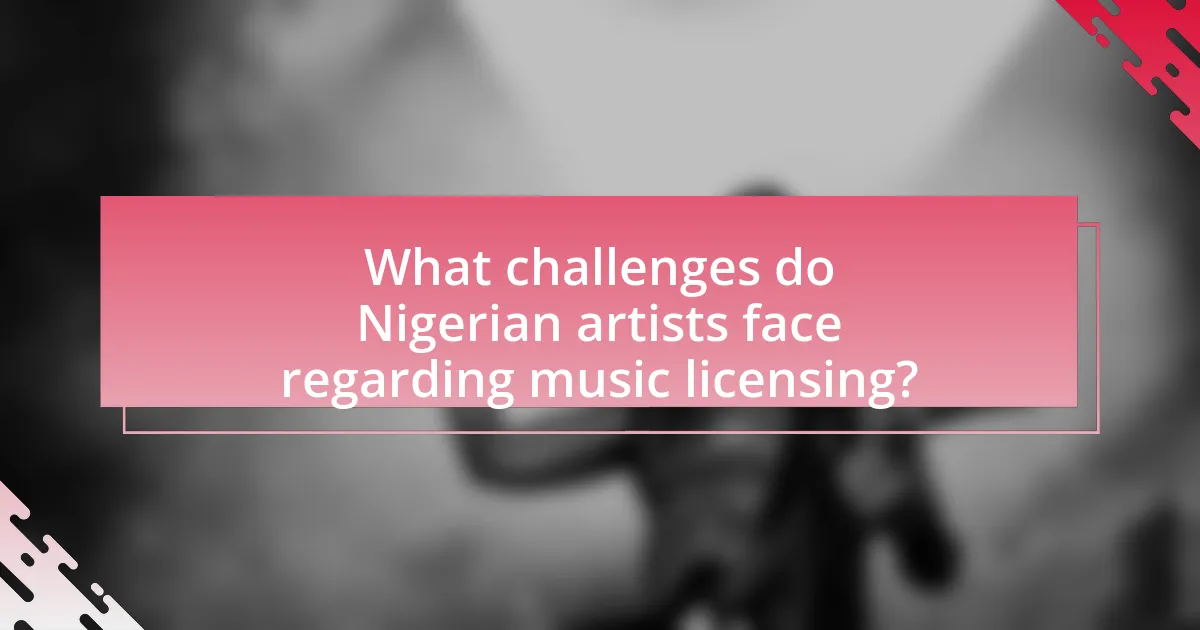
What challenges do Nigerian artists face regarding music licensing?
Nigerian artists face significant challenges regarding music licensing, primarily due to inadequate legal frameworks and enforcement mechanisms. The lack of a robust copyright system in Nigeria leads to widespread piracy, which undermines artists’ ability to earn revenue from their work. According to the World Intellectual Property Organization, Nigeria’s enforcement of copyright laws is weak, resulting in artists often not receiving fair compensation for their music. Additionally, many artists struggle with navigating the complexities of licensing agreements, which can be convoluted and difficult to understand without legal assistance. This situation is exacerbated by limited access to resources and information about their rights, further complicating their ability to protect their intellectual property effectively.
How does lack of awareness affect music licensing?
Lack of awareness significantly hinders music licensing by preventing artists from understanding their rights and the legal requirements for using music. This ignorance can lead to unauthorized use of copyrighted material, resulting in legal disputes and financial penalties. For instance, a study by the International Federation of the Phonographic Industry (IFPI) found that many artists in Nigeria are unaware of the licensing processes, which limits their ability to monetize their work effectively. Consequently, this lack of knowledge not only affects individual artists but also stifles the growth of the music industry as a whole, as unlicensed music usage undermines the revenue streams that support artists and their creative endeavors.
What are common misconceptions about music licensing?
Common misconceptions about music licensing include the belief that once a song is created, it is automatically protected, and that all music can be used freely as long as credit is given. In reality, music requires specific licenses for different uses, such as synchronization licenses for film and mechanical licenses for distribution. Additionally, many assume that licensing is only necessary for commercial projects, but even non-commercial uses can infringe copyright if proper permissions are not obtained. According to the U.S. Copyright Office, copyright protection is granted upon creation, but licensing is essential for legal use in various contexts.
How can education improve licensing practices among artists?
Education can improve licensing practices among artists by providing them with essential knowledge about copyright laws, licensing agreements, and the financial implications of their work. By integrating comprehensive music licensing curricula into educational programs, artists can learn how to navigate the complexities of intellectual property rights, ensuring they understand the importance of protecting their creations. For instance, studies show that artists who receive formal training in licensing are more likely to secure fair compensation for their work, as they are equipped with the skills to negotiate contracts effectively. This knowledge empowers artists to make informed decisions, ultimately leading to better licensing practices and increased revenue in the music industry.
What role do organizations play in music licensing for Nigerian artists?
Organizations play a crucial role in music licensing for Nigerian artists by managing copyright and ensuring that artists receive fair compensation for their work. These organizations, such as the Copyright Society of Nigeria (COSON) and the Performing Musicians Employers Association of Nigeria (PMEAN), facilitate the collection of royalties from various platforms that use music, including radio, television, and streaming services. They also provide legal support and advocacy for artists’ rights, helping to navigate the complexities of copyright law. For instance, COSON has been instrumental in enforcing copyright laws and collecting royalties, which has led to increased revenue for Nigerian musicians.
How do performance rights organizations support artists?
Performance rights organizations (PROs) support artists by collecting and distributing royalties for the public performance of their music. These organizations monitor various platforms, such as radio, television, and live venues, to ensure that artists receive compensation whenever their work is played. For instance, in the United States, PROs like ASCAP and BMI reported distributing over $1 billion in royalties to songwriters and composers in 2020, demonstrating their crucial role in protecting artists’ financial interests. By managing licensing agreements and ensuring compliance, PROs enable artists to focus on their creative work while securing their earnings from performances.
What resources are available for artists seeking licensing help?
Artists seeking licensing help can access several resources, including organizations like the Copyright Society of Nigeria (COSON), which provides guidance on copyright issues and licensing. Additionally, platforms such as the Music Publishers Association (MPA) offer educational materials and support for music licensing. Legal services specializing in intellectual property can also assist artists in navigating licensing agreements. Furthermore, online resources like the U.S. Copyright Office website provide comprehensive information on copyright registration and licensing processes, which can be beneficial for artists in Nigeria as they seek to protect their work and understand their rights.
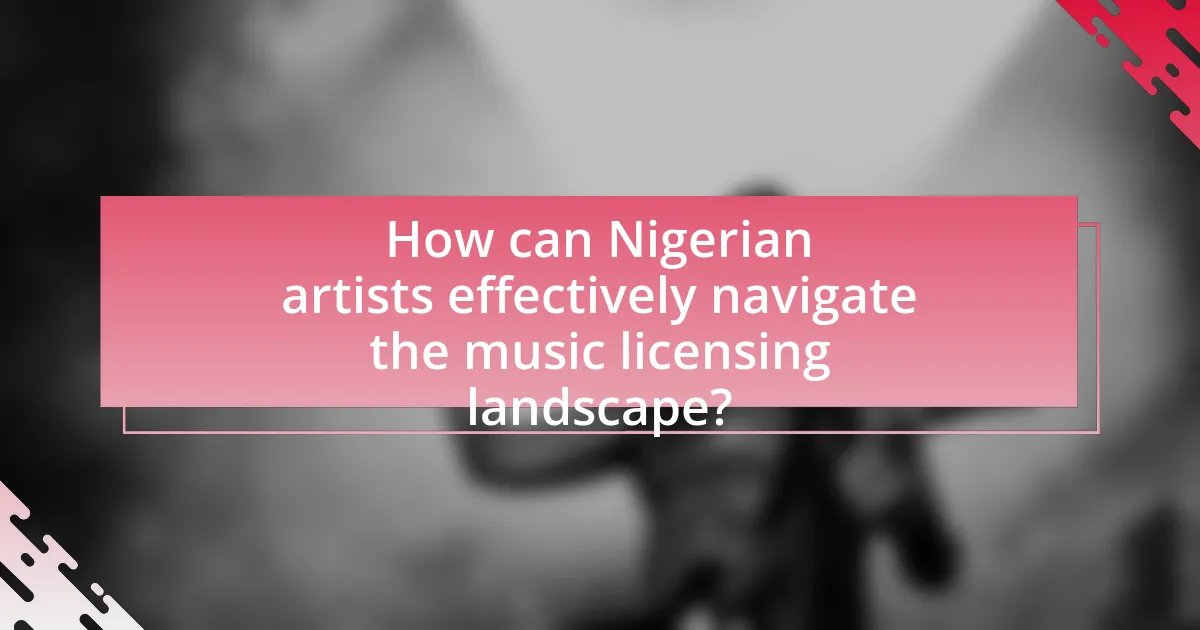
How can Nigerian artists effectively navigate the music licensing landscape?
Nigerian artists can effectively navigate the music licensing landscape by understanding the legal frameworks governing copyright and licensing in Nigeria, as well as actively engaging with relevant organizations. Familiarity with the Copyright Act of 1970, which protects the rights of creators, is essential for artists to safeguard their work. Additionally, joining organizations like the Performing Musicians Employers Association of Nigeria (PMEAN) and the Copyright Society of Nigeria (COSON) can provide artists with resources, support, and guidance on licensing processes. These organizations help artists manage their rights and ensure they receive royalties for their work, thereby reinforcing the importance of proper licensing in the music industry.
What steps should artists take to ensure proper licensing?
Artists should take the following steps to ensure proper licensing: first, they must understand the different types of licenses required for their work, such as mechanical, synchronization, and performance licenses. Next, artists should register their works with a copyright office to establish legal ownership, which provides protection against unauthorized use. Additionally, they should consider joining a performance rights organization (PRO) to facilitate the collection of royalties and ensure their music is licensed for public performance. Furthermore, artists should negotiate contracts carefully, ensuring that all licensing terms are clearly defined and agreed upon. Lastly, they should keep detailed records of all licensing agreements and communications to maintain transparency and accountability. These steps are crucial for protecting their intellectual property and maximizing their revenue potential in the music industry.
How can artists keep track of their licenses and rights?
Artists can keep track of their licenses and rights by utilizing digital rights management (DRM) tools and maintaining organized records of their agreements. These tools help artists monitor the usage of their work, ensuring they receive appropriate royalties and can enforce their rights effectively. For instance, platforms like SoundExchange and ASCAP provide services that track performances and distribute royalties, which is crucial for artists in the music industry. Additionally, artists should regularly review their contracts and agreements to stay informed about their rights and obligations, as this proactive approach helps prevent potential disputes and ensures compliance with licensing terms.
What are best practices for negotiating licensing agreements?
Best practices for negotiating licensing agreements include thorough preparation, clear communication, and understanding the value of the intellectual property involved. Preparation involves researching market rates and comparable agreements to establish a baseline for negotiations. Clear communication ensures that both parties articulate their needs and expectations, reducing misunderstandings. Understanding the value of the intellectual property allows negotiators to advocate effectively for terms that reflect its worth. For instance, a study by the International Federation of the Phonographic Industry highlights that artists who are well-informed about their rights and the market can secure better licensing terms, demonstrating the importance of these practices in achieving favorable outcomes.
What resources are available for Nigerian artists to learn about music licensing?
Nigerian artists can access several resources to learn about music licensing, including online courses, workshops, and industry organizations. Websites like Coursera and Udemy offer courses specifically focused on music licensing, while organizations such as the Copyright Society of Nigeria provide workshops and seminars that cover the legal aspects of music rights. Additionally, the Nigerian Copyright Commission offers guidelines and resources on copyright laws relevant to music licensing, ensuring artists understand their rights and obligations. These resources collectively equip artists with the knowledge needed to navigate the complexities of music licensing effectively.
Which online platforms offer guidance on music licensing?
Online platforms that offer guidance on music licensing include SoundExchange, ASCAP, and BMI. These platforms provide resources and information on how to navigate the complexities of music licensing, including copyright registration and royalty collection. For instance, SoundExchange specializes in collecting and distributing digital performance royalties, while ASCAP and BMI offer educational materials and support for songwriters and composers to understand their rights and licensing options.
How can networking with industry professionals aid in understanding licensing?
Networking with industry professionals significantly enhances understanding of licensing by providing direct access to expert insights and real-world experiences. Engaging with professionals allows individuals to learn about the complexities of licensing agreements, copyright laws, and industry standards through firsthand accounts and discussions. For instance, professionals often share case studies or examples of successful licensing deals, which can clarify the practical implications of licensing in the music industry. Additionally, networking can lead to mentorship opportunities, where experienced individuals guide newcomers through the nuances of licensing, thereby fostering a deeper comprehension of the subject.
What are the key takeaways for Nigerian artists regarding music licensing?
Nigerian artists must understand that music licensing is crucial for protecting their intellectual property and ensuring they receive fair compensation for their work. Proper licensing allows artists to legally distribute their music, gain access to royalties, and prevent unauthorized use of their creations. According to the Nigerian Copyright Commission, artists who register their works can enforce their rights and seek legal recourse against infringement, which underscores the importance of formalizing their music through licensing agreements. Additionally, engaging with performance rights organizations can help artists collect royalties from public performances, further emphasizing the financial benefits of music licensing.
